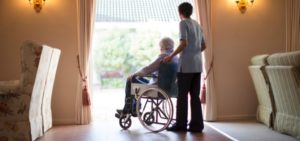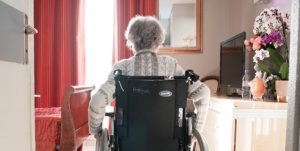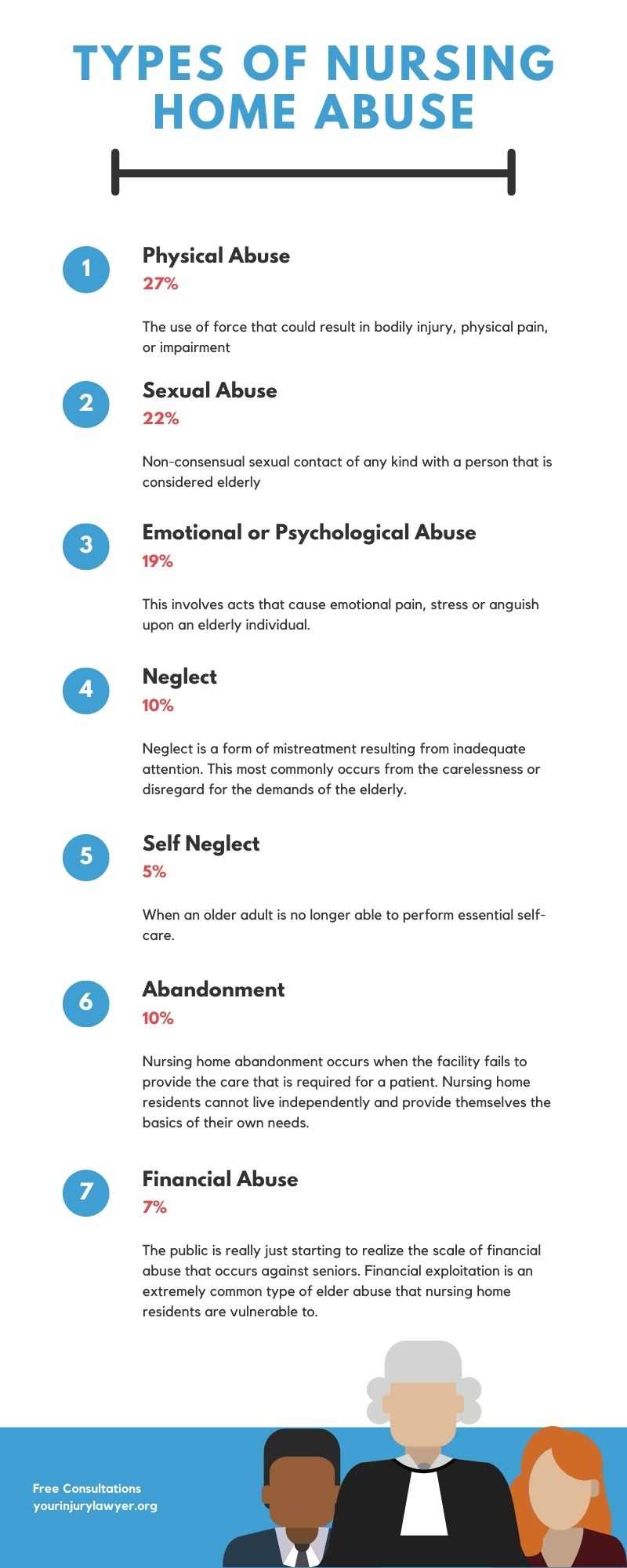
Elder and nursing home abuse is nationally recognized as a problem, one that is continuing to plague societies all across America.
Unfortunately, this matter isn’t likely to go away soon.
Due to ongoing problems like:
It has been difficult for state and local governments to solve this issue. Current estimates indicate that approximately 1 to 2 million Americans…
(Age 65 and older)
Have been abused or neglected within a nursing home or assisted living facility. (National Center on Elder Abuse, 2005)
A very discouraging point is that the majority of the victims are female.
With loose regulation and more and more families placing their elderly relatives in institutional care…
This kind of abuse is going to continue.
Nursing home abuse can come in 7 different forms, some of which are more difficult to identify than others.
Page Contents:
At its core, physical abuse is defined as the use of force that could result in bodily injury, physical pain, or impairment.
This type of abuse is typically the easiest to identify and prove, due to the evidence this abuse leaves behind.

Physical abuse can include:
(Though not limited to)
In addition, any use of inappropriately distributing drugs, use of physical restraints, or force-feeding, are also examples of this type of abuse.
This is especially dangerous because senior citizens can be frail and easily injured.
This is why acts of physical contact that can seem minor…
Would still be considered physical abuse.
For example:
If staff at an institution is holding a tight grip on an elderly person’s arm that causes bruising (with intent to harm or control the individual), that can be considered abuse under the right conditions.
Concern for this type of abuse is especially heightened, because of the continued growth in the elderly population.
In 1995 there was an estimated global population of 542 million people over the age of 60. It is predicted that in 2025 the global population of the elderly will more than double to 1.2 billion people.
(according to a study by the National Institute on Aging).

Physical abuse is a serious danger to the livelihoods of the elderly, especially those within remote nursing facilities that withhold less than desirable conditions.
Sexual abuse is defined as non-consensual sexual contact of any kind with a person that is considered elderly.
This also involves those that are considered “incapable” of providing consent.
This includes:
Unfortunately, this category of abuse on elders is poorly understood and under-researched.
Victims of sexual abuse in general have trouble communicating the situation, but these difficulties are amplified in the elderly.
A situation as sensitive as this, combined with victims who are likely to have preexisting medical problems that involve communication, confusion, and memory loss, makes it increasingly difficult to uncover these cases.
All of this interferes with the ability of the elderly to report the abuse and explain it in detail.

If you suspect a relative or friend of yours is victim to sexual abuse…
Here are some telltale signs that this abuse has occurred.
If you notice any of these signs…
You will need to seek legal help. The first step is to set up your free case evaluation and get connected with a lawyer.
(All consultations are considered COMPLETELY confidential).
Common perpetrators of elder abuse can be friends, live-in nursing aids, nursing home assistants, family members, or other types of care providers that are left alone with the victim.
Emotional abuse involves acts that cause emotional pain, stress or anguish upon an elderly individual.
This type of abuse is usually verbal.
(Although doesn’t always have to be the case).
Non-verbal examples of emotional abuse include giving an older person the silent treatment, or isolating them socially from their friends & family.

Oftentimes emotional abuse can be a byproduct of either physical or sexual abuse.
Common forms of psychological related abuse occur in the form of:
Here are a few statistics related to elder emotional abuse:
If it’s discovered that emotional abuse has taken place, the victim should be relocated from their current living arrangements to a place where they can feel safer.
This could be within another nursing facility or within the family’s home.
Evidence of emotional abuse can sometimes be difficult to spot. The elderly person may show behaviors that signal something is wrong.
This includes the following:
If a victim of this type of abuse is suspected, this individual may need a psychiatric evaluation in order to assess the situation further.

A mental health professional may ask the victim questions about how they were treated, what activities they usually participate in, and who they typically interact with.
Neglect is a form of mistreatment resulting from inadequate attention. This most commonly occurs from the carelessness or disregard for the demands of the elderly.
This also involves the failure to fulfill a caretaking obligation.
Though state laws differ, most of them have provisions in place that define caretaker neglect.
For example, in California under state law, caretaker neglect is defined as:
“Caretaker neglect” under § 26-3.1-101 and § 18-6.5-102 occurs when adequate food, clothing, shelter, psychological care, physical care, medical care, or supervision is not secured for the at-risk adult or is not provided by a caretaker in a timely manner and with degree of care that a reasonable person in the same situation would exercise.
More than half of all reported cases of elder abuse have some sort of neglect element to them.
Whether it’s intentional or unintentional…
It’s based on ignorance or denial that the elderly need as much care as they do.
If an individual has suffered from any form of elder abuse – They may experience self-neglect.

This means that an older adult is no longer able to perform essential self-care.
These self-care activities could involve:
Under California Law self-neglect is defined separately:
Self-neglect (defined separately): act or failure to act whereby an at-risk adult substantially endangers the adult’s health, safety, welfare, or life by not seeking or obtaining services necessary to meet the adult’s essential human needs. Choice of lifestyle or living arrangements shall not, by itself, be evidence of self-neglect:
Other forms of Neglect include the following.
Physical Neglect:
This is defined as the failure to attend to a person’s medical, hygienic, or nutritional needs. Other signals of physical neglect include the lack of dispensing proper medications, changing bandages, bathing, grooming, or dressing.
Emotional Neglect:
This includes any cause of emotional pain, distress, or anguish, by ignoring the needs of these adults. This can include the neglect to discount the emotional well-being of others, as well as actions to isolate adults from visits or contact by certain family friends.
Financial Neglect:
This involves the complete disregard of someone’s financial obligations. Whether it be failing to pay rent, mortgage, medical insurance, utility and garbage bills, or taxes.
Note: The definition of neglect varies from jurisdiction to jurisdiction. It’s important to understand the local laws and regulation in your area.
If you suspect that you or a loved one has fallen victim to a form of neglect…

It’s critical that you talk to a lawyer immediately. Under certain circumstances, you may be eligible for financial compensation for damages suffered as a result of the alleged neglect.
Consultations are 100% free, and there are no fees unless you win your case.
Nursing home abandonment occurs when the facility fails to provide the care that is required for a patient.
By the nature of these facilities…
Nursing home residents cannot live independently and provide themselves the basics of their own needs.
In general, residents at nursing homes need items like:
When these seniors do not get the level of care that they need, the situation can get bad fast.
Seniors can get bedsores, or face hygiene and nutritional problems in just a few days.
In general, nursing home abandonment is not just about forgetting one day to give a patient their medication….

It’s about systematic neglect, representing a behavioral pattern that indicates a complete disregard for someone’s needs.
We should note that unintended nursing home abandonment does in fact constitute elder abuse. Even if the staff means well, neglect can come from inadequate training or due to the facility being understaffed.
Liability for the issue falls on the facility administrators who allowed either overcrowding or understaffing conditions to continue.
The public is really just starting to realize the scale of financial abuse that occurs against seniors.
Financial exploitation is an extremely common type of elder abuse that nursing home residents are vulnerable to.
As many as 5% of Americans over the age of 60 have experienced some type of financial exploitation every year.
Research estimates that billions of dollars were exploited by older Americans in 2019 alone.
This type of abuse can occur in many ways. Some of the following are the most common.
Theft from the resident’s room: Because people in nursing homes have very little privacy, there is a stream of people going in and out all day. These factors make it easy to steal from unsuspecting residents.
Misuse of Checkbook: (or credit cards): People can sometimes get their hands on the checkbooks of trusting residents, where they will use them to pay for things in their own financial interest.

Using Scare or Threatening Tactics: Residents that are old and sick can be easily afraid. This makes them a target for abusers, who can threaten seniors for a variety of reasons.
Oftentimes these matters can be hard to discuss, but if you or someone you know fell victim to this type of abuse, it’s important to get in touch with a lawyer right away.
If you or a family member has been suffering from abuse or neglect at a nursing home, long-term care facility, or skilled nursing facility, you may be eligible for compensation.
Our affiliated nursing home abuse attorneys are there to fight for a favorable outcome for your unique situation.
Get in touch with us today for a FREE no-obligation consultation. A lawyer will be in touch to discuss your unique situation and evaluate your potential case.
There are no fees unless you win your case. Call us at (855)344-1017 today!
